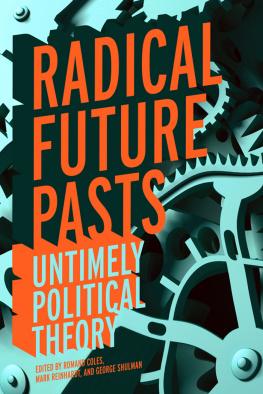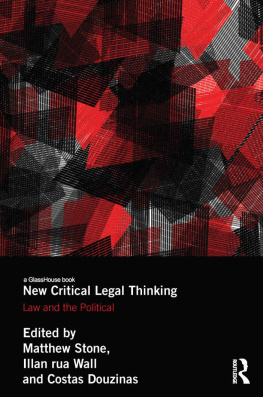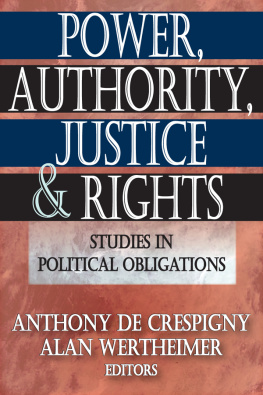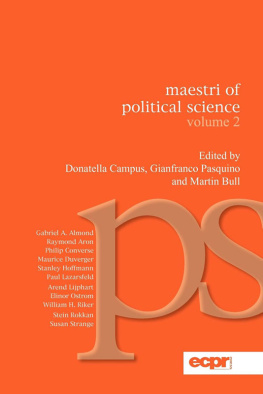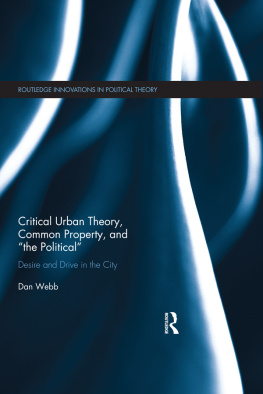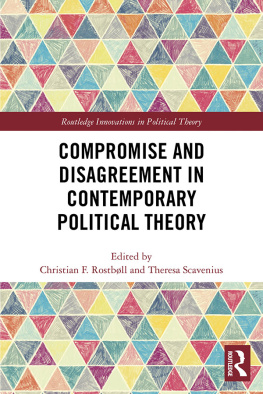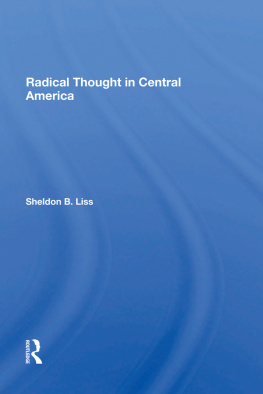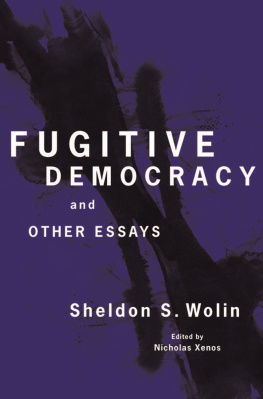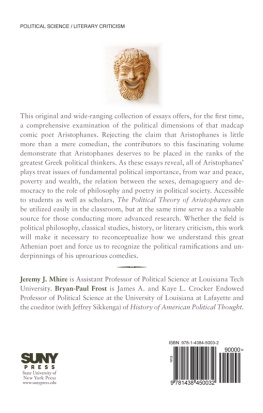Due to variations in the technical specifications of different electronic reading devices, some elements of this ebook may not appear as they do in the print edition. Readers are encouraged to experiment with user settings for optimum results.
Copyright 2014 by The University Press of Kentucky
Scholarly publisher for the Commonwealth,
serving Bellarmine University, Berea College, Centre College of Kentucky, Eastern Kentucky University, The Filson Historical Society, Georgetown College, Kentucky Historical Society, Kentucky State University, Morehead State University, Murray State University, Northern Kentucky University, Transylvania University, University of Kentucky, University of Louisville,
and Western Kentucky University.
All rights reserved.
Editorial and Sales Offices: The University Press of Kentucky
663 South Limestone Street, Lexington, Kentucky 40508-4008
www.kentuckypress.com
Library of Congress Cataloging-in-Publication Data
Radical future pasts : untimely political theory / Edited by Romand Coles, Mark Reinhardt, and George Shulman.
pages cm.
Includes bibliographical references and index.
ISBN 978-0-8131-4529-7 (hardcover : alk. paper) ISBN 978-0-8131-4552-5 (pbk. : alk. paper) ISBN 978-0-8131-4554-9 (pdf) ISBN 978-0-8131-4553-2 (epub)
1. Political scienceHistory. I. Coles, Romand, 1959 II. Reinhardt, Mark. III. Shulman, George M.
JA81.R164 2014
This book is printed on acid-free paper meeting the requirements of the American National Standard for Permanence in Paper for Printed Library Materials.
Manufactured in the United States of America.
| Member of the Association of
American University Presses |
PREFACE
This book is inspired by and dedicated to Peter Euben. An intervention into debates about the forms of political theory, the ways in which theorists draw upon or reconfigure the past, the prospects for radical democratic politics, and the relations among them, it is offered as something of an antifestschrift. The essays collected here are not about Peters work but are engagements with these problemsjust as the anti-introduction that follows this preface and dedication provides a context for those essays but is not directly about them, either. Still, this is a book in Peters honor, and we would like to begin with an account of why so many political theorists have felt it important to participate in such an enterprise.
Like Thucydides and his fellow Athenians, Peter Euben was born into the world to take no rest and give none to others. Among those to whom he has given no rest are his students, and Peters life of extraordinary pedagogical performances has ensured that all the contributors to this volume of essays, as well as many others we would have liked to include, can count themselves students of Peter whether they actually attended his classes or not. It may be that Peters greatest gift is indeed creating students. This does not mean acolytes, for what distinguishes his teaching is an uncanny capacity, in person and through his writing, to help so many people find their own way into (or voice for) theorizing politics. He has done so in person partly because he is an acute listener, but also because of a style of thinkingwe might call it thinking out loudthat can best be described metaphorically.
Surely, Peters thinking is a kind of traveling, as if his task is to carry a thoughthis own or anothersto as many of its potential implications, say, destinations, as possible. At the same time, Peters thinking surely involves unpacking all the layers and aspects of an idea, issue, or event. If the one metaphor evokes the original meaning of the Greek root theria, not only its association with vision, but also with the envoys (theroi) delegated to travel and report back as well as with the ships (therides) that carried them, the other metaphor suggests the historical and genealogical inquiries that always accompany his comparative focus and attention to both text and context. If unpacking suggests the archaeological sense of layered complexity in Peters thinking as well as its use of so many disciplines and idioms to interpret the impure multiplicity of political life, traveling suggests its refusal of boundaries, embrace of adventure, and risk of exposure. If the metaphor of unpacking also intimates how neatly ordered schemas are undone by the out of place, call it the dirty laundry, of a reality that is never neatly organized in layers, the metaphor of traveling obviously indicates that theorizing is being (like) a stranger at home as well as finding ways to be at home in the strange places thinking takes us. Though it is common to say of both democracy and political theory that it is not the destination but the journey that matters, the mildness of this expression obscures the intellectual depth and adaptability, the ethical wisdom, the experiential authority, and the sheer determination that go into the journeys that Peter prepares and enables.
If Peters way of thinking generates students because of the character of its complexity and open-minded mobility, however, a third metaphor also seems crucial. For it seems to us that something like the image of the jester is needed to capture the humor, irreverence, vulgarity, playfulness, and sheer pleasure or even jouissance in the thinking out loud that characterizes Peters lectures and his essays. As we know from Shakespeare and Plato, humor is necessary to address or face the most serious things, but whereas many assert this in sober tones that belie the claim, Peter is actually funny, and this must be counted part of his gift in creating students.
But the qualities that make Peters thinking so generative are especially fruitful in creating students of politics. His fundamental theoretical insight is that politics is a practice at once distinctive and impureand distinctive in part because impure. As every aspect of life is put into play in and by any action in politics, and as political events involve multiple actors, interests, and perspectives as well as unintended consequences, so political maturity means confronting impurity. Intentions are inescapably lodged in obscurely motivated bodies; each intention or claim is endlessly confounded by mirroring and projection; and acting with real and recalcitrant others in a space of appearances necessarily entails entanglement not only in rhetoric and compromise, but also in violence. Thus it is that political theorizing must unpack layers to grasp the actualities in play in a situation, must travel to grasp the perspectives and blindness of self and of others, and must joke to remain sane amid maddening frustrations. Peters instinctive sensibility and way of thinking lead us into the dilemmas that make politics a calling at once noble, infuriating, and shameful. His Rabelaisian embrace of his own humanity is thus essential to his theorizing politics in a way that clears space for democratic dialogue at once honest about the depths of human cruelty and injustice and hopeful about the capacity of ordinary citizens to do extraordinary things in creating a better common world.

